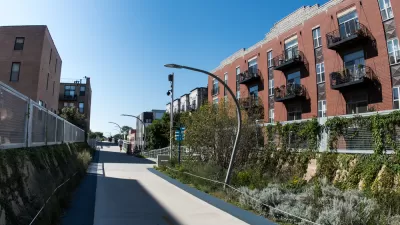In fact, that's putting it positively, as the battle may already have been lost according to House Transportation Chair John Mica. Enhancements, most of which fund pedestrian and bicyle projects, may become voluntary rather than a requirement.
"The question is this: With the nation facing a transportation crisis that has gotten little attention outside of policy wonks and Washington, should the federal government continue to mandate that states spend federal dollars on pedestrian safety, bicycling trails, landscaping and historic preservation?"
Readers may recall that this issue - the requirement that states and metropolitan transportation organizations include funding for transportation enhancements - that also include landscaping by freeways and transportation museums, making the entire enhancement program an attractive target by some, was targeted by Sen Tim Coburn (R-OK) who held up the extension of transportation funding bill, threatening to end collection of the federal gas tax come Sept. 30.
"House Transportation Committee Chair Mica (R-Fla.) said (enhancements) won't be included in the long-term (transportation) funding bill he expects to produce this fall. And Coburn said he has received assurances on the Senate side that the spending will be made optional rather than mandatory.
"The federal transportation enhancement program governed the spending of $927.5 million federal dollars in fiscal 2011, about 2 percent of the total $40.2 billion highway budget.
"This program has been the lifeblood of the nation's trails, biking and walking programs," said Kevin Mills, vice president of the Rails-to-Trails Conservancy. "It's wildly popular across the country."
Outside of enhancements, there appears to be harmony between the House and Senate approaches to reauthorization of the transportation funding bill.
From Republicans pitch transportation construction bill as major, bipartisan jobs program": "Their support for higher funding levels is a very positive thing," Sen. Barbara Boxer, (chair of the Environment and Public Works Committee) said in an email. "I am confident that (the Senate) will pass a two-year bill which would be fully paid for, and I am very open to a six-year bill as long as it is fully paid for in a way that has bipartisan support and does not cut jobs elsewhere in the economy to pay for transportation."
Thanks to Streetsblog Capitol Hill
FULL STORY: Federal transportation funding mandates — the coming Capitol Hill battle

Manufactured Crisis: Losing the Nation’s Largest Source of Unsubsidized Affordable Housing
Manufactured housing communities have long been an affordable housing option for millions of people living in the U.S., but that affordability is disappearing rapidly. How did we get here?

Americans May Be Stuck — But Why?
Americans are moving a lot less than they once did, and that is a problem. While Yoni Applebaum, in his highly-publicized article Stuck, gets the reasons badly wrong, it's still important to ask: why are we moving so much less than before?

Research Shows More Roads = More Driving
A national study shows, once again, that increasing road supply induces additional vehicle travel, particularly over the long run.

Judge Halts Enforcement of Anti-Homeless Laws in Grants Pass
The Oregon city will be barred from enforcing two ordinances that prosecute unhoused residents until it increases capacity and accessibility at designated camping sites.

Advancing Sustainability in Los Angeles County Schools
The Los Angeles County Office of Education’s Green Schools Symposium brings together educators, students, and experts to advance sustainability in schools through innovative design, climate resilience strategies, and collaborative learning.

Using Old Oil and Gas Wells for Green Energy Storage
Penn State researchers have found that repurposing abandoned oil and gas wells for geothermal-assisted compressed-air energy storage can boost efficiency, reduce environmental risks, and support clean energy and job transitions.
Urban Design for Planners 1: Software Tools
This six-course series explores essential urban design concepts using open source software and equips planners with the tools they need to participate fully in the urban design process.
Planning for Universal Design
Learn the tools for implementing Universal Design in planning regulations.
City of Moreno Valley
Institute for Housing and Urban Development Studies (IHS)
City of Grandview
Harvard GSD Executive Education
NYU Wagner Graduate School of Public Service
City of Cambridge, Maryland
Newport County Development Council: Connect Greater Newport




























